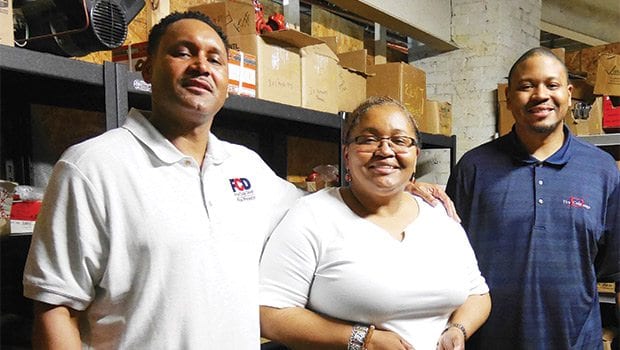Fire Code Design’s Ronnette Taylor-Lawrence charts a path from trades to entrepreneurship

As an entrepreneur and a tradeswoman, Ronnette Taylor-Lawrence has been a trailblazer. Starting as a young single mother in the 1980s, she worked her way up from laborer to journeyman plumber, becoming the first woman of color to receive her plumber’s license from the Plumbers and Gasfitters Local 12 Boston union. Today, she is a master plumber and fire sprinkler contractor running her own business, Fire Code Design, a Boston-based full service fire extinguisher and fire safety company offering sales, repairs and service to commercial and residential clients.
On the web
Fire Code Design is located at 195 Dudley St., Boston.
Call them at (617) 442-2633 or visit: www.firecodedesign.com
Watch a video: Ronnette Taylor-Lawrence discusses home sprinklers: http://bit.ly/2qR2E01
Formed in 2006, her company today has 12 employees and serves about 170 clients a year. Clients have included the MBTA, Amtrak, the Reggie Lewis Center and Hanscom Air Force Base. For Taylor-Lawrence, a West Medford native who lives in Boston’s Mattapan neighborhood, a primary goal is to build FCD’s reach within the surrounding community.
“Every commercial establishment that has a sprinkler, fire alarm or fire extinguisher system has to be inspected a minimum of once a year,” Taylor-Lawrence points out, speaking to the Banner recently in FCD’s Roxbury office. “I’d like to have at least 70 percent of our work in this community, and be able to offer jobs and training to people coming from the community.”
FCD’s team today includes specialists in sprinkler design, fire suppression systems and fire extinguishers, as well as bookkeeping, scheduling and operations staff. Taylor-Lawrence’s oldest son, Anthony, is director of business development and the youngest, Julian, is assistant project manager and apprentice sprinkler fitter. Their vision includes expanding FCD’s work in fire and life safety education and training.
As part of its local connection, FCD hires interns from Roxbury Community College, typically students who are advancing their skills in business administration or accounting.
Moving up
Taylor-Lawrence was a warehouse worker at a plumbing company when she enrolled in a pre-apprenticeship training program that had been formed to encourage women considering trades. Then her employer sponsored her to join the plumbers union and begin the four-year union apprenticeship. In 1990, she passed the test to become a licensed journeyman plumber.
After amassing years of expertise working for others, the plumber and sprinklerfitter started Fire Code Design from the basement of her home in 2006. She participated in the Small Business Association’s 2008 Emerging Leader Initiative, and in 2009 was able to move her business to its current location at 195 Dudley Street. The space provides an office area, room for equipment storage, and a display window for a more visible street presence.
Women make up only a tiny minority in construction trades, but the numbers are starting to climb in Massachusetts, according to Susan Moir, director of research for UMass Boston’s Labor Resource Center and co-founder of the Policy Group on Tradeswomen’s Issues. Statewide, the proportion of female union apprentices has nearly doubled in 10 years, rising from less than 3 percent up to 7 percent. In the Plumbers Local 12 union, women’s participation rose from 2.1 percent in 2012 to 5.6 percent in late 2016. Half of all women entering the trades are women of color, Moir noted, so in this field increasing gender diversity also strengthens racial diversity.
A pioneer in the field, Ronnette Taylor-Lawrence credits a strong support system and her faith in helping her make it, starting back in the apprenticeship days when she attended classes three nights a week while holding down a full-time job and caring for three children ranging in age from 11 to 2.
“For any woman with children, you have to have a support system,” she says, “ Just think about it, having to get to work before 7 a.m. with little kids. I surrounded myself with my family, my elders, and my church. I would drop the youngest one at his grandmother’s house the night before, and the oldest one would help with some cooking and cleaning,” she recalls. And, she notes, she finished with perfect attendance.
Growing pains
Persisting and succeeding in a male-dominated trade may be daunting for many women; adding entrepreneurship into the mix can bring new challenges along with the satisfaction of ownership.
One challenge in business growth is the amount of expensive insurance coverage required to bid on certain types of projects such as inspection, testing and maintenance (ITM) for large property management companies. The insurance barrier becomes a chicken-or-egg problem for many contracting entrepreneurs: without strong cash flow, it’s nearly impossible to afford more insurance — yet without that extra insurance in place, small and mid-size businesses can’t even bid on the projects that could ensure steady revenue.
And even as the number of women in construction trades inches up, an old-boy network’s habits die hard.
“Guys want to talk to guys,” Taylor-Lawrence says. “Being a woman of color, I’m not expected to know things. Men will talk right past me to my sons.”
But she is tough, independent and proud of what she’s accomplished, including how she proved her mettle to various doubters along the way. Mastering a trade has enabled her to support her family and own a home. She would not hesitate to recommend the same to girls and women today.
“Plumbing changed my life,” she says. “There’s a lot of single parents out there, and it can change your life. In the pipe industry, there are all kinds of avenues to grow — if you become a fire extinguisher technician, you can work ‘mothers’ hours.’ It’s a good job, and it will always be needed. It’s mandatory. We need to make sure the buildings are safe.”
She adds, “Everybody should have a trade. You can get all the education in the world, but you never know when you’ll be at a point where you need some kind of side job. You’ll never go hungry with a trade.”






